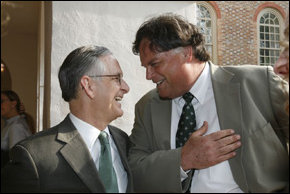
In this 2007 photo, Sen. Tommy Norment appears with former William & Mary President Gene Nichol. Nichol presented him with the Prentis Award for civic involvement benefiting the college and community. Said Nichol: “Our College—like our community and our Commonwealth—is beyond fortunate to have Tommy Norment in our corner. William and Mary couldn’t ask for a more devoted advocate in Richmond.”
Does Sen. Tommy Norment, R-Williamsburg, have a conflict of interest regarding legislation affecting William & Mary?
Like many Virginia lawmakers, the Senate Majority Leader attended two Virginia institutions of higher education – the Virginia Military Institute and the College of William & Mary school of law. Unlike his colleagues, he is employed by a Virginia university. He works as an adjunct professor at William & Mary, which pays him $60,000 a year. That’s on top of his $50,000-a-year state senator’s salary and earnings from his private law practice with Kaufman & Canoles.
Sen. J. Chapman Petersen, D-Fairfax County, objected when a half-dozen tuition-reform bills he and other senators sponsored were routed from the Senate higher education subcommittee to the Senate Finance Committee, where they have died. Norment is co-chair of the Finance Committee.
“That’s an obvious conflict of interest if you have someone who’s an employee of an institution who is going to sit in judgment on all these tuition bills,” Petersen said, reports Karin Kapsidelis with the Richmond Times-Dispatch.
Norment did not return Kapsidelis’ phone call asking for a response.
Concerns about Norment’s ties to W&M have dogged both the university and him for years. Eight years ago, W&M President Taylor Reveley justified having Norment on the payroll this way:
Before Senator Norment joined us, we had only one full-time Coordinator of Legal Affairs and one part-time Assistant to the Provost for Legal Affairs (focusing on disciplinary matters). We have badly needed more inside legal help.
The work Senator Norment does as a William & Mary employee is substantive and demanding. His employment here is not a Potemkin village. His work involves both teaching and legal advice. His teaching has been extensive and successful. From the beginning of his time at William & Mary, the Senator has provided me with legal counsel. He continues to do so while also now working closely with our Coordinator of Legal Affairs.
Tommy Norment’s compensation reflects his status as an experienced lawyer coming from private practice. It is less than would be expected for someone of his seniority and ability in private practice or the corporate world. It makes sense for a university, however, and is consistent with how we compensate our other lawyers.
No “quid pro quo” was involved in Senator Norment’s and my conversations about the possibility of his joining William & Mary. The Senator did not offer to do anything for William & Mary in return for employment. Nor did I premise the possibility of his employment here on his doing anything for the university in the future.
No quid pro quo was necessary. Norment was an advocate for W&M before he went on the payroll, and he no doubt will continue to be when he leaves. And, to be fair, Norment is not the only powerful senator opposing tuition reform. Sen. Richard L. Saslaw, D-Fairfax, the senate minority leader, supported diverting the reform bills to Senate Finance.
When Petersen asked why a higher-ed bill was assigned to the finance committee, Saslaw responded, “It’s going to Finance when you start messing around with out-of-state numbers.” Presumably he was referring to caps on the number of out-of-state students at UVa and W&M. The General Assembly did not need to “micro-manage” the universities, Saslaw added.
(For details on the bills, see “Virginia Higher Ed Faces Backlash.”)
Bacon’s bottom line: How deep do the ties between a legislator and university have to run before it becomes a objectionable conflict of interest? Let me set the stage by asking some hypothetical questions:
• What if an Altria employee served in the state senate and voted against a higher tobacco tax? Would there be any question at all? It would be universally regarded as a conflict of interest.
• What if a Dominion Virginia Power employee served in the state senate and approved a measure that would increase electric rates? Clearly a conflict of interest. Del. Peter Farrell, R-Henrico, has abstained from voting on Dominion-related legislation on the grounds that his father was CEO of Dominion.
• What if the provost of W&M served in the state senate and deep-sixed measures designed to curb tuition increases? Clearly a conflict of interest.
• What if a tenured faculty member of W&M served in the state senate and deep-sixed measures designed to curb tuition increases? Still a conflict of interest.
 The whole thing smells fishy to me.
The whole thing smells fishy to me.


